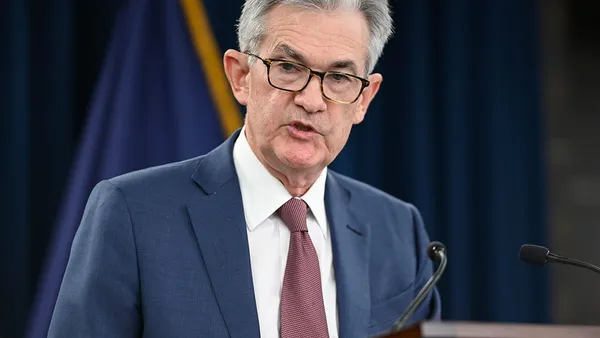Dive Brief:
- Consumer confidence slumped in May to the lowest level in six months, the Conference Board said Tuesday, reporting results from a survey that coincided with a partisan deadlock over the debt ceiling, stress in the banking system and signs of tightening credit standards.
- A gauge of consumers’ expectations — measuring their short-term view on the prospects for income, business and the labor market — persisted below a level that usually signals a recession within the next 12 months, the Conference Board said. Such pessimism has lingered since February 2022, with the exception of a brief gain last December.
- “Consumers’ view of current conditions became somewhat less upbeat while their expectations remained gloomy,” Ataman Ozyildirim, senior director of economics at the Conference Board, said in a statement. “Their assessment of current employment conditions saw the most significant deterioration,” he said, noting that from April to May the proportion of consumers reporting “plentiful” jobs fell 4 percentage points to 43.5%.
Dive Insight:
Results from the Conference Board survey aligned with a 7% decrease in consumer sentiment in May as reported by a University of Michigan survey released on Friday.
The decline in consumer sentiment reversed almost half of the gains achieved since the record low in June 2022, Joanne Hsu, director of the Michigan survey, said in a statement. “This decline mirrors the 2011 debt ceiling crisis, during which sentiment also plunged.”
Despite their worsening outlook, consumers spent briskly in April. Their outlays, which drive about 70% of the economy, increased 0.8% compared with back-to-back gains of just 0.1% in February and March.
Solid wage growth and 3.4% unemployment — which matched the lowest rate since 1969 — has sustained consumer spending despite price pressures and rising interest rates. Personal income grew 0.4% in April for the biggest gain this year, the Commerce Department said Friday.
Vehicles, concert tickets, cruises and summer travel were among the items that registered the biggest gains in consumer outlays, the Commerce Department said.
“This stuff that's being supported by the wealthier half of Americans still feels very, very vibrant,” Tom Barkin, president of the Federal Reserve Bank of Richmond, said Tuesday in an interview webcast by the National Association for Business Economics.
The Conference Board confidence survey, completed on May 22 before an initial agreement on the debt ceiling, suggests murky prospects for consumer confidence at best. Their outlook remains far gloomier than the period before the start of the pandemic in early 2020.
The proportion of consumers who said jobs were “hard to get” rose to 12.5% from 10.6% in April, according to the Conference Board. Also, the share of consumers who expect business conditions to improve fell to 12.9% from 14.1% in April.
Consumers expect inflation to average 6.1% during the next 12 months, a small decline from 6.2% in April and a big decline from the 7.9% peak in 2022, the Conference Board said.
“Nonetheless, consumers continued to view inflation as a major influence on their view of the U.S. economy,” Ozyildirim said.
The consumer price index in April rose 4.9% on a 12-month basis.
The Fed’s preferred measure of inflation — the core personal consumption expenditures price index excluding volatile food and energy prices — rose 0.4% in April and 4.7% from a year earlier, or more than double the Fed’s 2% inflation target, the Labor Department said Friday.












